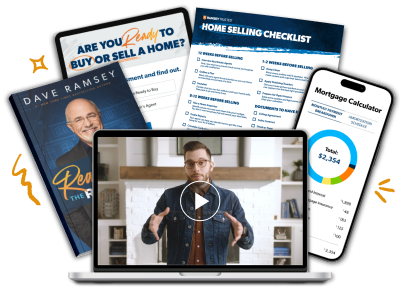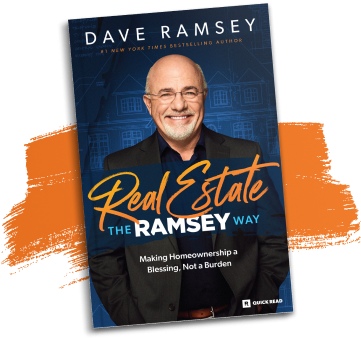

So, you’re thinking about buying a house. That’s exciting! Not only is buying a home a great way to build wealth, but there’s something special about owning your house—it feels more like home.
But I’m guessing you’ve got one big question on your mind: How much money do I need to buy a house? Figuring out exactly how much you need to save can be tricky, but don’t worry! I’m going to walk you through the numbers so you can make a good, realistic savings goal that’ll help make your future home a blessing—not a curse.
A good number to shoot for when saving for a house is 25% of the sale price to cover your down payment, closing costs and moving expenses. (This amount is separate from saving up 3–6 months of your typical living expenses in a fully-funded emergency fund—which I recommend you do first, before saving up for a home.)
So if you’re looking to buy a $300,000 house, you should save around $75,000.
But here’s the thing about saving for a house: I can’t give you an exact answer for how much money you’ll need because the right amount for you will depend on your specific situation. For example, your savings goal will depend on how big of a home you want to buy, whether you’re a first-time home buyer, and how far you’re planning to move.
So, to make sure you know exactly how much you should save for your individual situation, let’s talk through the three biggest home-buying costs I mentioned earlier: your down payment, closing costs and moving expenses.

Find everything you need to help make confident decisions and reach your home goals.
You should shoot for a down payment of at least 20%—that’ll keep you from having to pay for private mortgage insurance (PMI). PMI is a yearly fee that runs about 1% of your loan balance, so avoiding it will save you big-time money. Plus, a bigger down payment means smaller monthly payments and less debt.
If you’re a first-time home buyer, it’s okay to make a 5–10% down payment, but be ready to pay for PMI. And putting down any amount less than 5% is a really bad idea, because that would mean taking on way too much debt and having really high monthly payments.
No matter how much money you decide to put down, it’s super important to make sure you’re buying a house you can afford. Your monthly payment (including taxes, homeowners insurance and HOA fees) on a 15-year fixed-rate mortgage should be no more than 25% of your take-home pay.
If you spend more than that, you’ll risk not having enough money left in your budget each month to put toward other important goals—like saving for retirement. And if you use a 30-year mortgage, you’ll pay tens of thousands in extra interest and you’ll stay in debt for an extra decade and a half. Yikes!
![]()
See how much house you can afford with our free mortgage calculator!
You should also not buy a house or start saving for one if you’re already in debt, because that’s a recipe for a big-time headache. Plus, when you pay off your debt and get rid of all those monthly payments first, it won’t take you nearly as long to save up a big down payment.
Oh, and I know this might sound crazy, but the best way to buy a home is paying for it in cash. Yep, I’m serious—a 100% down payment. If you don’t believe buying a house with cash is possible, here’s a stat that may change your mind: About a quarter (26%) of the existing homes sold in June 2023 were purchased without a loan. 1 Those people saved a ton on interest.
The term closing costs refers to the fees you pay for services that help to officially close the deal on a house. For buyers, closing costs usually include:
If you’re wondering how much all that stuff costs, home inspections average $340 and appraisals are typically around $360. 2,3 Unfortunately, everything else on the list will be a lot pricier.
When you put all your closing costs together, they’ll probably add up to about 3–4% of the home’s sale price. 4 That’s how much you should be ready to pay.

Learn Dave Ramsey’s roadmap to buy, sell and invest in real estate the right way, so your home can be a blessing, not a burden.
Now, if you’re able to bribe enough friends and family members with pizza to help you move all your stuff for free, then you have great friends and you can skip this part! But if not, you’ll probably be on the hook for some moving costs. Moving expenses aren’t nearly as pricey as the other costs we’ve gone over, but you also won’t be able to cover them with spare change you dug out from under your couch cushions.
The amount you pay in moving costs will depend on how you want to handle your move. If you choose to hire movers, plan to pay around $1,700. 5 But if you go the DIY route by renting a moving truck and packing your own stuff, your cost will go down.
Now that we’ve looked at the numbers, let’s put them all together. If you were planning to buy a $250,000 house and put 20% down so you can avoid paying PMI, here’s how much you’d need to save up:
Home Price: $250,000
Cost
Percentage of Home Price